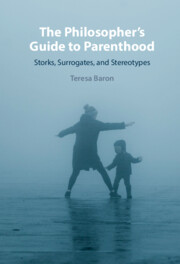Book contents
- The Philosopher’s Guide to Parenthood
- The Philosopher’s Guide to Parenthood
- Copyright page
- Dedication
- Contents
- Acknowledgements
- Introduction
- Chapter 1 Babies, Blueprints, and Blood Ties
- Chapter 2 Social Roles, Stereotypes, and Being ‘Seen’ as a Parent
- Chapter 3 ‘Do You Have a Licence for That?’ Legal Parenthood and Transfers of Children
- Chapter 4 Duties, Dilemmas, and (Re)distribution
- Chapter 5 Paradigms and Parental Projects
- Conclusion
- Bibliography
- Index
Introduction
Published online by Cambridge University Press: 15 January 2023
- The Philosopher’s Guide to Parenthood
- The Philosopher’s Guide to Parenthood
- Copyright page
- Dedication
- Contents
- Acknowledgements
- Introduction
- Chapter 1 Babies, Blueprints, and Blood Ties
- Chapter 2 Social Roles, Stereotypes, and Being ‘Seen’ as a Parent
- Chapter 3 ‘Do You Have a Licence for That?’ Legal Parenthood and Transfers of Children
- Chapter 4 Duties, Dilemmas, and (Re)distribution
- Chapter 5 Paradigms and Parental Projects
- Conclusion
- Bibliography
- Index
Summary
This book delves into the four concepts of parenthood – social, biological, legal, and moral – at play in our understandings of parental rights and obligations, reproductive ethics, governance of parenthood, and ontologies of kinship. Our view of what it means to be a parent in any given context is shaped by all of these concepts, which are themselves subject to the influence of changing expectations, as new technologies are produced, cultural views of the family are transformed, and laws shift in response. These changes give rise to questions: who has the right to raise a child? What do we owe our children? Who should the law recognise as a parent, and what is the meaning of that recognition? Many of these questions are not questions about some independent notion of ‘parenthood’ but about the relationships between different concepts of parenthood. In doing so, I highlight newer but no less important questions for philosophical attention, including the scope of rights to become a biological parent (or to avoid that state), the impact of gendered norms on the social role of ‘parent’, and the legal difference between having a child and acquiring one.
Keywords
- Type
- Chapter
- Information
- The Philosopher's Guide to ParenthoodStorks, Surrogates, and Stereotypes, pp. 1 - 14Publisher: Cambridge University PressPrint publication year: 2023

